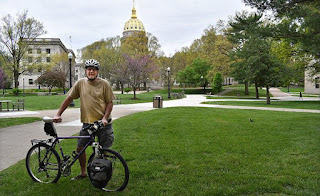As the majority of Americans support equality for LGBTQ people, women, members of racial and ethnic "minorities," the disabled and others who have been marginalized, those on the other side--who see rights they've always enjoyed as "special privileges" when extended to members of the groups of people I've mentioned--become more virulent, vicious and even violent in expressing anger at having to share their privilege.
Among the empowered are motorists who think the roads are theirs, and theirs alone. They accuse us--cyclists, pedestrians and users of mass transportation--as being subsidized by tax dollars (which, too often, the privileged don't even pay). Some among them think they have a "right" to express their umbrage in whatever way they choose--even if it endangers or kills the objects of their rage.
While I still interact, thankfully, with many courteous drivers--especially those who drive trucks--I have also had more charged interactions with aggressive drivers than I can recall in some time. On the return leg of a ride to Connecticut, just as I was crossing the state line at Glenville and King Streets, some guy who looked like his wife hadn't given him any since Obama's first term pulled up alongside me, in his pickup truck, just so he could shout "Fuck you!"
While the temperature has risen, so to speak, since Trump first ran for President, I can't put all of the blame on him (as tempting as that may be). Rather, I've noticed that some celebrities--mostly male, all of them privileged by their wealth and fame-- expressing veiled and not-so-veiled hostility toward those who aren't "the cool kids" in their eyes. A while back, Whoopi Goldberg whined, on The View, about the chauffered drive to her gated community being slowed down by, oh, 7 seconds or so, by a cyclist. Now it seems that "comedian" Paul Costabile, who seems to sneer with the smugness of a bully who knows that nobody will fight him, took a video of himself taunting a cyclist who was riding as far to the right as he could.
The worst part, though, is that Costabile is taking the video while driving. Now, unless he's employing some trick of which I'm not aware, he's leaning as he's driving with one hand. So, he's endangering the cyclist even more than he would have had he simply shouted slurs and curses out his window.
In the meantime, Costablile whined about having to watch that rider "work his glutes." Sounds to me like he's insecure: He looks like he can use some time with his feet on two pedals rather one foot on one pedal.
That, of course, is what causes the privileged to pick on those who've just won the same rights they've always enjoyed: It's scary for those who've enjoyed power and privilege to realize that other people could actually challenge their place in the social, political and economic heirarchy. We, as cyclists, do that by our presence: It shows motorists that the roads don't "belong" only to them.
Note: The video in this post was deleted from Instagram. However, I was able to post it thanks to a screengrab by @_deeno.






















